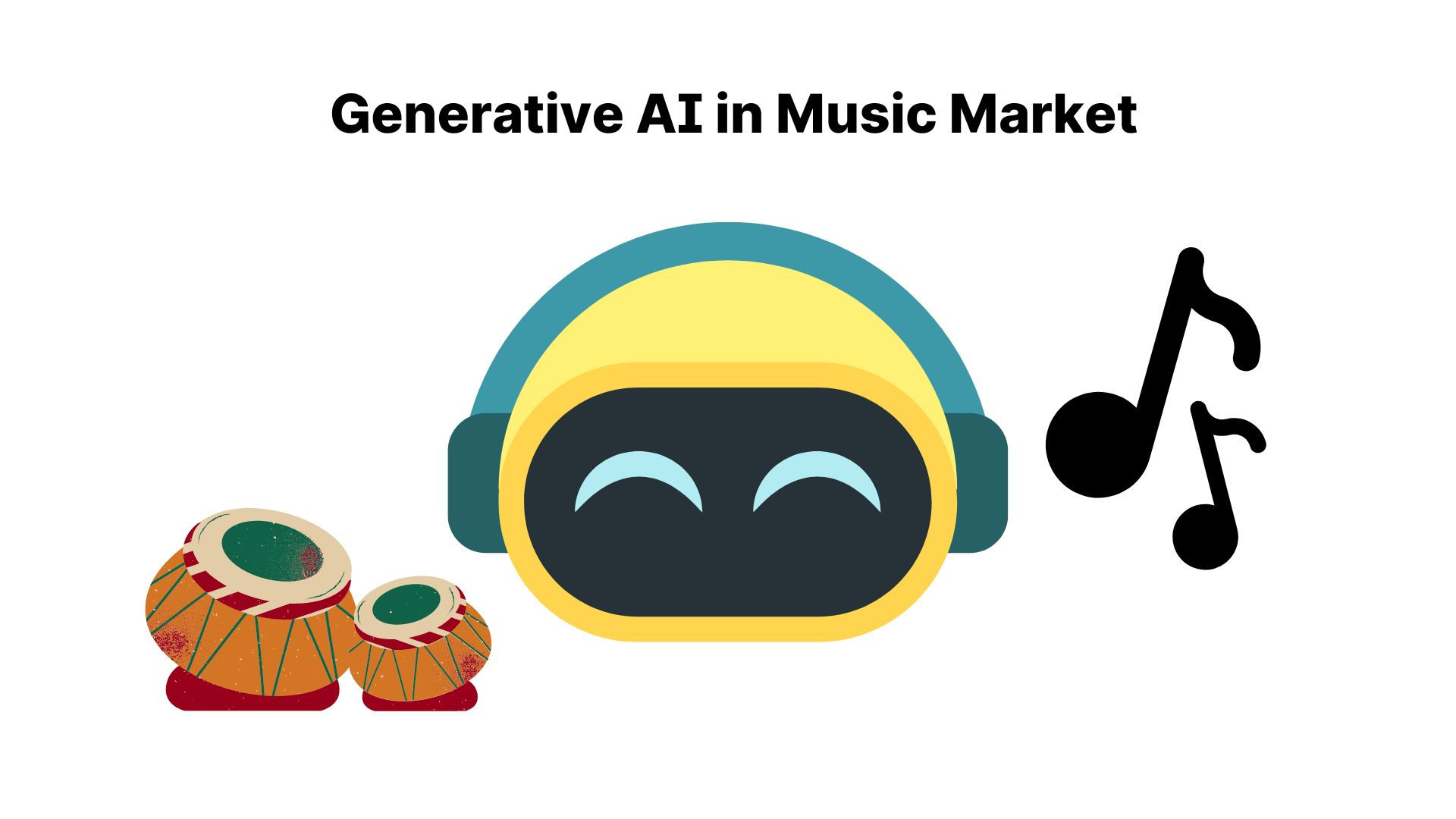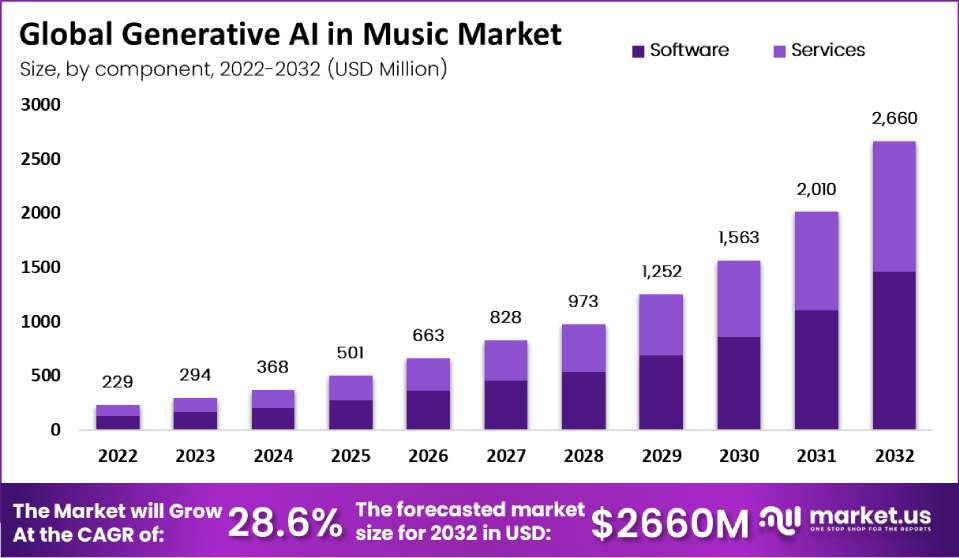Generative AI in Music Market Size to hit USD 2,833 Bn, Globally, by 2032

Page Contents
Market Overview
Published Via 11Press : In 2022, the Global Generative AI in Music Market was estimated at USD 229 Million and projected to experience compound annual growth rates of 28.6% through 2032 – reaching an expected value of USD 2,833.0 Million by that year.
Generative AI music production and consumption is an ever-expanding market that is revolutionizing how music is created and consumed. Generative AI employs algorithms and machine learning models to generate music that is both unique and original; its popularity has skyrocketed over the years due to its ability to produce music that not only innovates but can also easily meet user preferences.
The global generative AI in music market can be divided into three broad categories: application, deployment model, and region. Based on application, this market can be further subdivided into music composition, music production, and live performance with music composition being expected to hold the largest market share due to its ability to create fresh new sounds. On-premise deployment models are anticipated to provide greater scalability, flexibility, and cost-efficiency whereas cloud deployment models offer cost savings due to their ability to scale rapidly while remaining flexible with regard to cost-effectiveness and scaling requirements.
Geographically, North America is expected to hold the highest market share during the forecast period due to the presence of major players and the high adoption of generative AI in this region. Europe and Asia-Pacific should experience significant growth throughout this time due to growing adoption rates for AI-powered music platforms within these regions.
Key players in the market for generative AI in music include AIVA, Amper Music, OpenAI, Google LLC, Sony Corporation, IBM Corporation, and Magenta. Each company strives to remain at the forefront of innovation through product creation, partnerships, and collaborations to expand its market presence and gain a competitive advantage within this niche industry.
For further details on major revenue-producing segments, request a pricing optimization software market Request for PDF sample report

Key Takeaways
- In 2022, the Global Generative AI in the Music Market was valued at USD 229 million. Between 2023 and 2032, this market is estimated to register the highest CAGR of 28.6%. It is expected to reach USD 2,833.0 million by 2032.
- Increased consumer interest in personalized music is driving market expansion, while music composition will likely remain the dominant form throughout this forecast period, due to its capacity for creating original tunes.
- Cloud-based deployment models are projected to hold the largest market share due to their ability to provide scalability, flexibility, and cost-effectiveness.
- North America is expected to account for the largest market share during the forecast period due to the presence of major players and the high adoption of generative AI in this region.
Regional Snapshot
- North America is expected to account for the highest market share during the forecast period due to the presence of major players and the high adoption rate for generative AI technologies in this region.
- Europe and Asia-Pacific can expect significant growth over the forecast period due to the increased adoption of AI-powered music platforms in these regions.
- Due to major companies like OpenAI, Google, and IBM being present, North America should be led by the US in terms of market dominance.
- Europe-wide, the United Kingdom is expected to experience significant expansion due to the increased adoption of AI-powered music platforms in this region.
- Asia-Pacific countries like China, Japan, and South Korea are projected to experience significant growth as AI-powered music platforms become more widely adopted and demand increases for personalized musical content in these markets.
Drivers
- Increasing demand for personalized music: Generative AI technology in music allows users to create customized and unique tunes, providing a major source of market expansion.
- Growing adoption of AI-based music platforms by music production companies: Music production companies are increasingly adopting AI-powered music platforms as an invaluable way of creating new and groundbreaking music while simultaneously cutting costs and saving time and effort.
- Ability to create new and unique music: Generative AI music creation provides the capability of creating original and distinctive pieces – which is essential to market growth.
- Advancements in Technology: Advancements in artificial intelligence technology such as machine learning and deep learning have made significant strides toward expanding generative AI's abilities within music, driving market expansion.
Restraints
- Lack of Understanding and Expertise in AI Technology: Music professionals and artists' lack of familiarity and proficiency in using AI is an obstacle to market growth.
- Ethical Issues: Using AI for music creation raises ethical considerations such as ownership and authenticity of its creation; these issues could impede its widespread adoption in music.
- AI-Based Music Platform Costs: Implementation costs associated with AI-based music platforms can become a significant roadblock to market growth for smaller music production companies.
- Customizability issues: While generative AI music allows for customized listening experiences, the customization options may be limited and could prevent its widespread adoption.
Opportunities
- The entertainment industry provides an outstanding venue for generative AI music production: movies, TV shows, and video games are increasingly demanding AI-generated tunes to enhance their production value.
- Integrating Generative AI Music With Other Technologies: Combining Generative AI music production with other technologies such as virtual and augmented reality can open up new avenues of market growth.
- Emerging Market Growth Potentials: Emerging markets such as Asia-Pacific and Latin America present tremendous opportunities for generative AI to gain market share due to increased adoption of technology within these regions.
Challenges
- Lack of Standardization: One major barrier to adoption of generative AI in music production is its absence.
- Legal and Ethical Concerns: AI use for music creation raises legal and ethical considerations relating to ownership and authenticity, which may prove challenging in terms of market expansion.
- Limited Knowledge and Understanding of AI Technology: Music professionals and artists lacking sufficient understanding or expertise of artificial intelligence technologies is a major obstacle to market expansion.
- Quality of Music Generated: Generative AI may produce music that does not always meet user or professional expectations in terms of its quality.
Recent Developments
- In April 2021, OpenAI released Jukebox, a neural network that can generate music in a wide range of genres and styles.
- In June 2021, AIVA, an AI-based music composition platform, signed a deal with Warner Music Group to create AI-generated music for the label's artists.
- In August 2021, Amper Music, an AI-based music composition platform, raised $15 million in a Series A funding round to expand its offerings and grow its team.
- In September 2021, Sony announced the launch of an AI-based music production software called Flow Machines, which uses machine learning to create music.
Key Market Segments
By Component
- Software
- Services
By Type
- GANs
- AR-CNNs
- Transformer-based Models
By Application
- Composition of Music
- Music Mastering
- Streaming Music
- Making of New Sounds
- Other Applications
Market Key Player
- Shutterstock Inc.
- Aiva Technologies SARL.
- Soundful
- Ecrett music
- Boomy Corporation
- OpenAI
- Amadeus Code
- Other Key Players
Report Scope
| Report Attribute | Details |
| The market size value in 2022 | USD 229 Mn |
| Revenue forecast by 2032 | USD 2,833.0 Mn |
| Growth Rate | CAGR Of 28.6% |
| Regions Covered | North America, Europe, Asia Pacific, Latin America, and Middle East & Africa, and Rest of the World |
| Historical Years | 2017-2022 |
| Base Year | 2022 |
| Estimated Year | 2023 |
| Short-Term Projection Year | 2028 |
| Long-Term Projected Year | 2032 |
FAQs
Q: What is generative AI in music?
A: Generative AI in music refers to the use of artificial intelligence to create new and unique music compositions.
Q: What are the applications of generative AI in music?
A: The applications of generative AI in music include creating personalized music, music production, and creating music for movies, TV shows, and video games.
Q: What are the benefits of generative AI in music?
A: The benefits of generative AI in music include the ability to create new and unique music, reducing costs and time in music production, and creating personalized music.
Q: What are the challenges of generative AI in music?
A: The challenges of generative AI in music include the lack of standardization, legal and ethical concerns, limited understanding and expertise in AI technology, and the quality of music generated.
Q: Which regions are expected to witness significant growth in the generative AI in music market?
A: North America, Europe, and Asia-Pacific are expected to witness significant growth in the generative AI in music market, with North America expected to hold the largest market share.
Content has been published via 11press. for more details please contact at [email protected]
The team behind market.us, marketresearch.biz, market.biz and more. Our purpose is to keep our customers ahead of the game with regard to the markets. They may fluctuate up or down, but we will help you to stay ahead of the curve in these market fluctuations. Our consistent growth and ability to deliver in-depth analyses and market insight has engaged genuine market players. They have faith in us to offer the data and information they require to make balanced and decisive marketing decisions.



